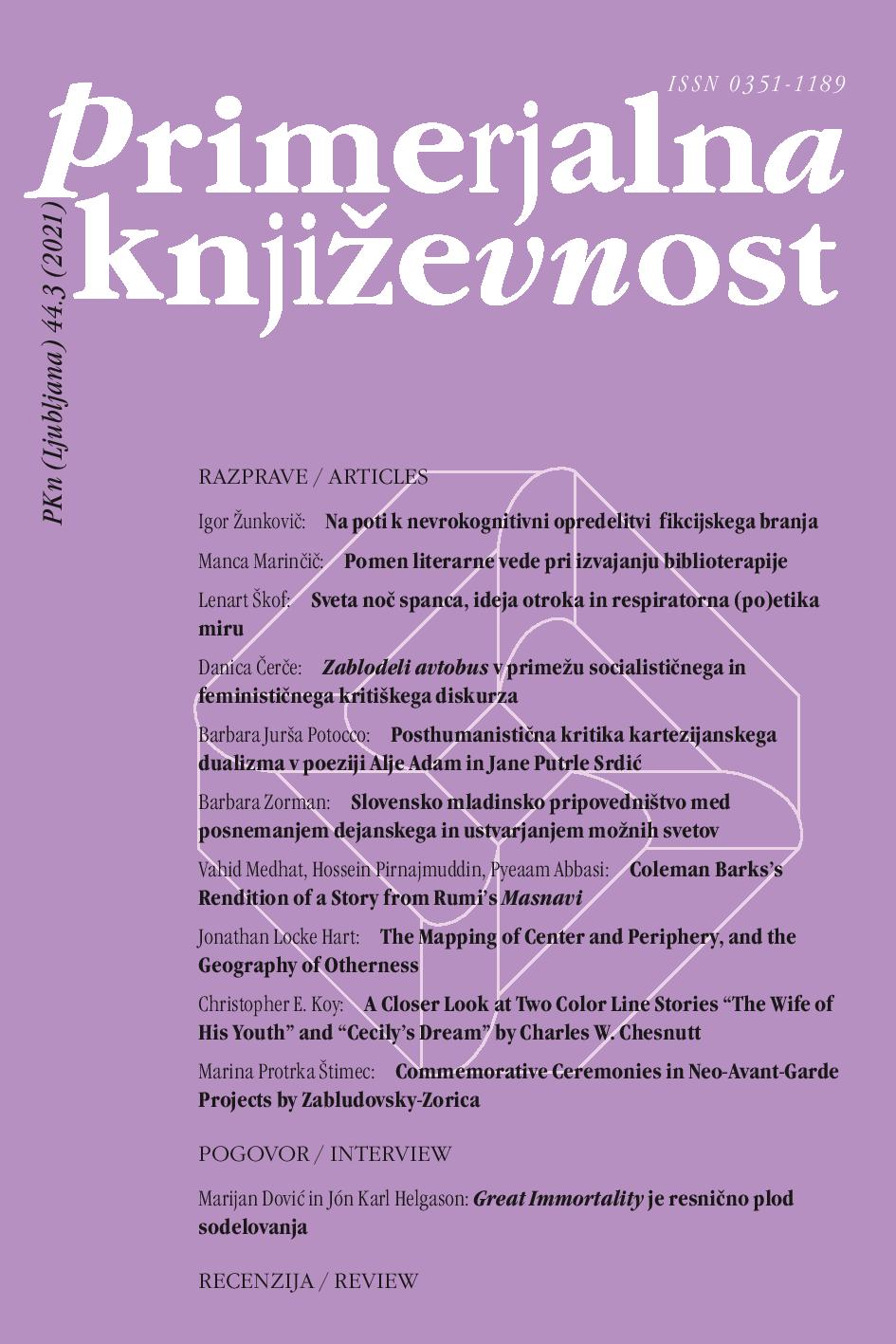The Contribution of Literary Studies to Bibliotherapy
DOI:
https://doi.org/10.3986/pkn.v44.i3.02Keywords:
literary criticism, bibliotherapy, reading, narratology, psychonarratology, empathyAbstract
Today we are aware that reading is important and its effects on the readers have been proven by many studies on this subject. Its importance is not studied only by literary studies. It is an interesting research field for many other studies. The researchers have been studying bibliotherapy for more than a hundred years now, but we can trace its beginnings all the way to the Bible and ancient Greek philosophers. Researchers in the fields such as psychiatry, psychology, pedagogics and librarianship do most of the contemporary research on bibliotherapy. Since the books are the key component of the bibliotherapy process, it is unusual that we rarely find scientific research about bibliotherapy amongst the experts of literary studies. The article focuses on the role of literary studies in the process of bibliotherapy—how it can contribute to the quality of choosing a text for bibliotherapy. It investigates the strategies of studying literary texts when searching for a text that will appropriately affect the participant of bibliotherapy. Hence, in choosing an appropriate text the psychonarratological approach is crucial.
References
Bortolussi, Marisa, in Peter Dixon. <em>Psychonarratology: Foundations for the Empirical Study of Literary Response</em>. Cambridge, New York, NY: Cambridge University Press, 2003.
Carr, Nicholas G. <em>Plitvine: kako internet spreminja naš način razmišljanja, branja in pomnjenja</em>. Prev. Tanja Ahlin. Ljubljana: Cankarjeva založba, 2011.
Dolinar, Darko. »Od recepcijske teorije k literarni antropologiji«. Spremna beseda. <em>Bralno dejanje: teorija estetskega učinka</em>. Wolfgang Iser. Ljubljana: Studia humanitatis, 2001. 359–378.
Furedi, Frank. <em>Moč branja: od Sokrata do Twitterja</em>. Prev. Sandi Kodrič. Ljubljana: UMco, 2017.
Gantar, Kajetan. »Uvodna razlaga«. <em>Poetika</em>. Aristoteles. Ljubljana: Študentska založba, 2012. 9–68.
Grosman, Meta. <em>Razsežnosti branja: za boljšo bralno pismenost</em>. Ljubljana: Karantanija, 2006.
Heath, Melissa Allen, idr. »Bibliotherapy: A resource to facilitate emotional healing and growth«. <em>School Psychology International</em> 26.5 (2005): 563–580.
Jauss, Hans Robert. <em>Estetsko izkustvo in literarna hermenevtika</em>. Prev. Tomo Virk. Ljubljana: LUD Literatura, 1998.
Keen, Suzanne. »A Theory of Narrative Empathy«. <em>Narrative</em> 14.3 (2006): 207–236.
Kovač, Miha. <em>Berem, da se poberem: 10 razlogov za branje knjig v digitalnih časih</em>. Ljubljana: Mladinska knjiga, 2020.
Lah, Klemen. »(Biblio)terapevtski procesi med poukom književnosti«. <em>Čudežnost besed: bibliopreventiva. Zbornik ob mednarodni konferenci o biblioterapiji/bibliopreventivi</em>. Ur. Sabina Burkeljca. Domžale: občina Domžale, 2010. 43–51.
Marjanovič Umek, Ljubica, in Maja Zupančič. »Vloga branja in pripovedovanja v otrokovem razvoju«. <em>Beremo skupaj: priročnik za spodbujanje branja</em>. Ur. Marina Blatnik Mohar. Ljubljana: Mladinska knjiga, 2003. 22–33.
Mazza, Nicholas. <em>Poetry Therapy: Theory and Practice</em>. Hove; New York, NY: Brunner; Routledge, 2003.
McCulliss, Debbie. »Bibliotherapy: Historical and research perspectives«. <em>Journal of Poetry Therapy: The Interdisciplinary Journal of Practice, Theory, Research and Education</em> 25.1 (2012): 23–38.
Pehrsson, D., in P. S. McMillen. »A Bibliotherapy evaluation tool: Grounding counselors in the therapeutic use of literature«. <em>The Arts in Psychotherapy</em> 32.1 (2005): 47–59.
Pezdirc Bartol, Mateja. <em>Najdeni pomeni: empirične raziskave recepcije literarnega dela</em>. Ljubljana: Slavistično društvo Slovenije, 2010.
Reščič Rihar, Tatjana, in Jože Urbanija. <em>Biblioterapija</em>. Ljubljana: Znanstvena založba Filozofske fakultete, 1999.
Ross, Catherine Sheldrick, Lynne E. F. McKechnie in Paulette M. Rothbauer. <em>Reading Matters: What the Research Reveals About Reading, Libraries, and Community</em>. Westport, CT; London: Libraries Unlimited, 2006.
Virk, Tomo. <em>Etični obrat v literarni vedi</em>. Ljubljana: LUD Literatura, 2018.
Virk, Tomo. <em>Literatura in etika</em>. Ljubljana: LUD Literatura, 2021.
Virk, Tomo. <em>Moderne metode literarne vede in njihove filozofsko teoretske osnove: metodologija 1</em>. Ljubljana: Znanstvena založba Filozofske fakultete, 1999.
Zabukovec, Vlasta. »Biblioterapija v knjižnici«. <em>Knjižnica</em> 61.4 (2017): 23–34.
Žunkovič, Igor. »Nevroznanost in literatura«. Spremna beseda. <em>Kako se literatura igra z možgani? Nevroznanost umetnosti in branja</em>. Paul B. Armstrong. Prev. Igor Žunkovič. Ljubljana: Znanstvena založba Filozofske fakultete, 2015. 217–227.


